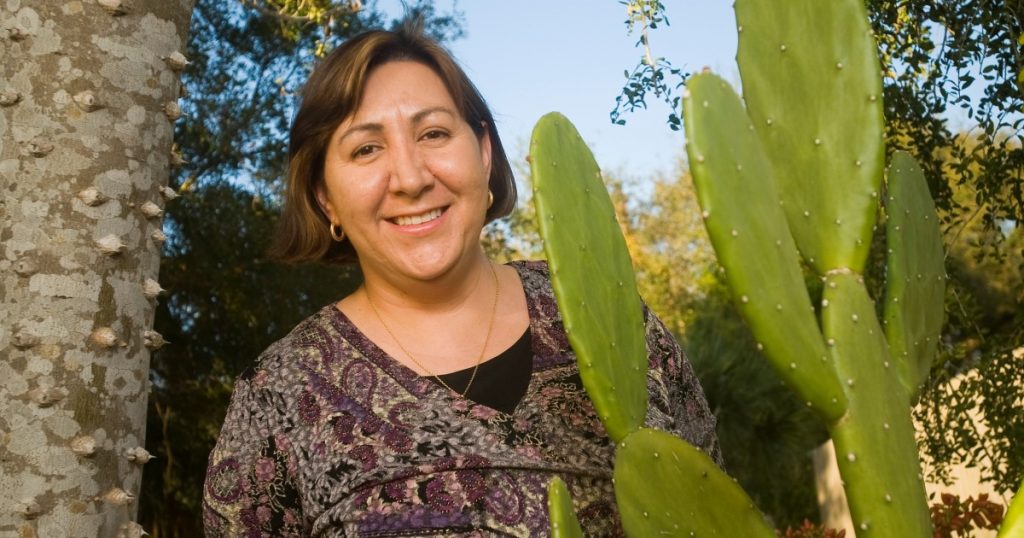The wisdom of the Mexican grandmother made her innovative granddaughter a success in the United States

Mexican chemical engineer Norma Alcantar, who holds 12 US patents based on the use of nopal, from cleaning water to stopping the formation of brain plaques that cause Alzheimer’s disease, confirms that she owes her scientific interest in this aloe vera to his country. Grandma Balbina Zamora.
Nopal (Opuntia ficus) focused on the inventions of Alcántar to clean water of sediments, bacteria, oil, and minerals, halt the progression of Alzheimer’s disease and even remove the strong smell of fish with a technique that this year will take to the hall of fame Florida inventors.
Of a total of 22 patents owned by this chemical engineer from the National Autonomous University of Mexico in the United States, she developed 12 inventions from a nopal-containing resin.
One of them is a water purification system that was successfully tested after the Deepwater oil spill in the Gulf of Mexico in 2010 and also in groundwater contaminated with minerals and bacteria in Haiti after the earthquake itself. Anus.
The Mexican, who holds a PhD from the University of California Santa Barbara and a researcher at the University of South Florida (USF) since 2003, says she cries that much of the credit goes to her grandmother.
He remembers that in his research paper at the University of South Florida, they proposed a search for oils from snakes, a reptile that he disliked, and out of nowhere something came to his head that his grandmother told him when he was a high school student in Ciudad de Mexico.
She told her grandmother about a class in chemistry about sulfates and her ability to clean up in detergents, so she replied that she knows how to clean water with nopal, a staple in Mexican cuisine.
He explained that when he was living in the countryside in Michoacan, where he used to grow corn, they used to cook aloe vera in water and add it to the water along with sediment and debris that they took from the pond to purify.
For Alcantar, who didn’t believe him at the time, it was like adding dirty water with the gelatinous green aloe vera to another dirty water with sediment in it.
However, years later, she experimented with it in her USF laboratory, and with great success developed this principle to become a pioneer in the chemical advancement of molecules of plant origin to remove water pollution.
The idea, he says, is to bring these inventions en masse to remote rural and developing areas that lack access to clean water, as well as areas affected by environmental and natural disasters.
However, the world is still advising poor communities the primitive use of nopal, a plant that reproduces very quickly and at low cost, so it is completely sustainable.
He notes that it is a “very noble” plant, which does not need much water, and has learned to grow in a variety of climates.
Powerful plant-based cleanser
His research found that the mucilage from aloe vera, which is the sticky part of its interior, now in the form of dust, can remove sediment, oil, radioactive isotopes, heavy metals, and even bacteria from the water.
The glue separates the oil droplets, making them smaller, this way the bacteria on the surface of the water can dissolve from them.
He adds that it works in the same way as Corexit, a chemical compound used in the Gulf of Mexico for oil spills, but with the advantage that it is not toxic to marine plants and animals.
Given that the mucilage can interact with the oil, which is an “anomalous” mixture of heavy hydrocarbons, it has been suggested to do so with the amyloid plaques that cause Alzheimer’s disease.
In his animal experiments, he found that gum can help prevent the growth of plaques that grow like a fungus in brain cells and cause memory loss in humans.
The chemistry teacher also created a gummy ball that eliminates the smell of fish and thus speeds up the marketing process without the need for prolonged washing with water.
The humility of the Latinos
Alcantar, who will be inducted into the Inventors Hall of Fame in Florida on November 5, is grateful for the influence his grandmother Balbina, who passed away in 2008, has had on his work.
Of her grandmother, she says, “She deserves more of this recognition. She passed on that knowledge. If it wasn’t at that time, I don’t know if there is another opportunity.”
Talking about her makes her very emotional. He says he remembers her as a humble and intelligent woman who instilled study in everyone, and had no chance for her.
The chemical engineer recalls that when she received the first grant from the National Science Foundation for the use of nopal in 2004, she told her grandmother that the experiment worked to clean up the sediment.
He remembers that she replied, “But Norma, I told you it would work.”
Knowing about gum and ten other inventions, such as technology that can kill cancer cells in the ovaries, the Mexican will join the select group of 58 Florida inventors in November who together hold more than 3,675 patents.
Alcantar admits he did not expect it to be because this honor was for “other people,” partly because he believed Latinos were accustomed to putting up “barriers.”
“As a Latina, they taught me to be humble, and for other people to know what we are doing,” she says.
She explained that, as a professor of chemical, biological and materials engineering, she had set out to inculcate the potential of science and technology for all without cultural “restrictions” on gender.
He says, “This is not true. We all have a good mind and it works the same way for men as it does for women.”

“Pop culture advocate. Troublemaker. Friendly student. Proud problem solver.”






:quality(70)/cloudfront-us-east-1.images.arcpublishing.com/metroworldnews/KAMPU362RJDWBEEJAHCQQIMWEE.jpg)



